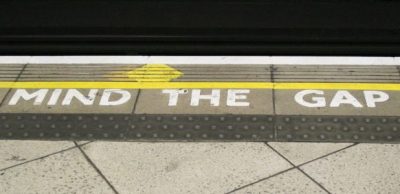
Years ago there was a pub on the Old Kent Road called The World Turned Upside Down. As a kid it intrigued me why something as mundane as a pub should adopt such a cryptic name. Now I have an inkling:
There are certain realms where common sense or the received wisdom just doesn’t seem to work anymore and you have to go beyond it in spite of everything you know:
- Getting into a skid and using opposite lock
- Factoring Relativity into the dynamics of fast-moving objects
- Exploiting Quantum Mechanical effects for semiconductors
- Using √(−1) – an imaginary number – to solve real problems
The inversion of aircraft controls at supersonic speed is apparently a Hollywood myth – shame, it would have been a good one. Nonetheless, there must be many more of these so do add them to the comments below.
My experience is that this inversion of common sense applies in particular to the realm of Self-Awareness, where one’s attention is turned away from the outside world of 10,000 things (as Lao Tzu described it), to the inner world of mind, thought and feeling. It really is The World Turned Upside Down – let me explain:
We have all, to some extent, been conditioned by upbringing to observe and judge our environment. Hot, cold, attractive, ugly, friendly, hostile, interesting, boring etc. etc. Every stimulus we encounter is met with a reaction based on how it makes us feel. And so the 10,000 things (including you and me) are observed and judged and categorised accordingly – almost nothing slips through this net.
But when we turn our attention to our own inner dynamics, this process no longer provides value – in fact it starts to work against us just as if we were turning into the skid rather than applying opposite lock.
The reason for this is blindingly simple. When we apply judgement to ourselves, it begs the question: Who is judging Who? And if that feels a little too Zen to understand, just sit with it and enjoy the paradox.
Now, the subject of Mindfulness has become a hot topic in a business and organisational context and I notice that, together with similar themes such as Emotional Intelligence, it easily gets subject to all kinds of judgement (rationalisation, reduction and analysis) that obscures its real value – a value which only seems to manifest beyond our natural mental habitat of polarities and opposites.
It frequently seems to be touted as a means to personal efficiency, resilience, charisma, influence, productivity, achievement and success (in whatever form takes your fancy).
My contention is that the greatest impact that Mindfulness can have is as an end in itself – and that as soon as you pursue a benefit through it, its power is attenuated.
If all this sounds somewhat elusive and esoteric, it is… but only through our rational, reductive faculties. All that Mindfulness is asking us to do is to Mind the Gap between what we sense and how we judge it – the stimulus and reaction – input and output.
So Mindfulness, practiced with sincerity (which is all that is needed) develops our ability to see what is going on in our inner world, without adding any extra noise.
And in this upside-down realm, rather than describing what it is and what it does (you can discover that very easily by practicing), it becomes more meaningful to describe what it isn’t, so that when these ideas pop up, you can let them go:
Mindfulness is not:
- A means of controlling your mind
- A guarantee of career success
- A short cut to influence and charisma
- A technique for generating ‘spiritual’ experiences
- Religious
Now what’s interesting is that Mindfulness can be any of the above – but used as a means to those ends, will disappoint. So when Ego pops in with attachment to these and other ‘benefits’, you can just let them go together with all the other noise.
And if you want to know more…
Try It!
